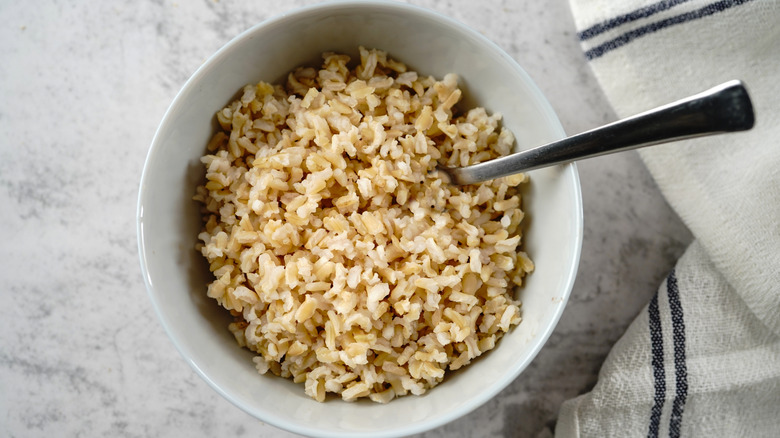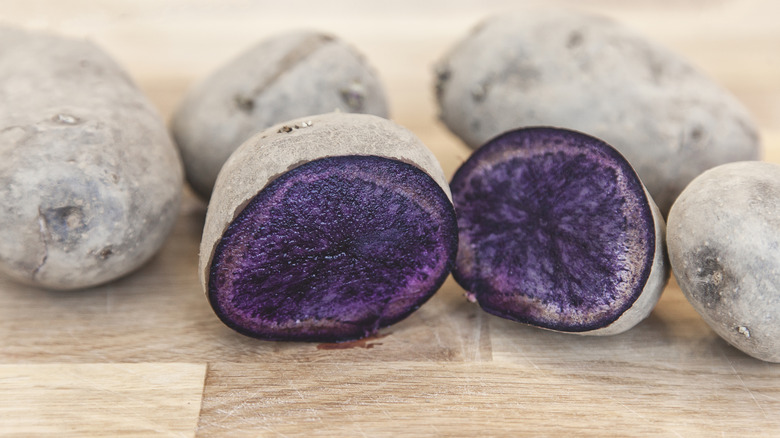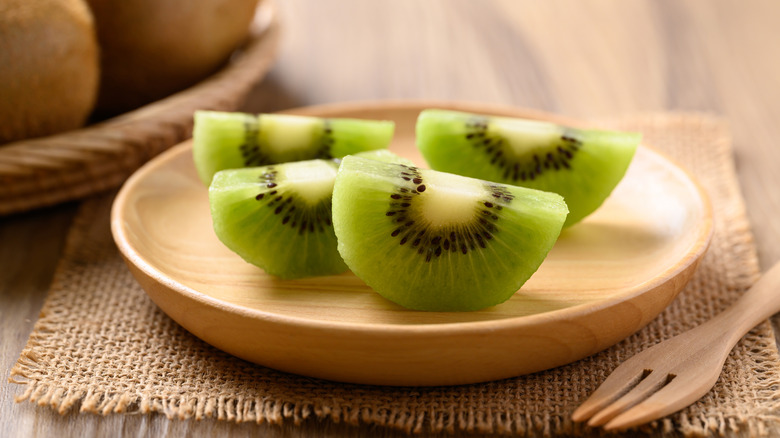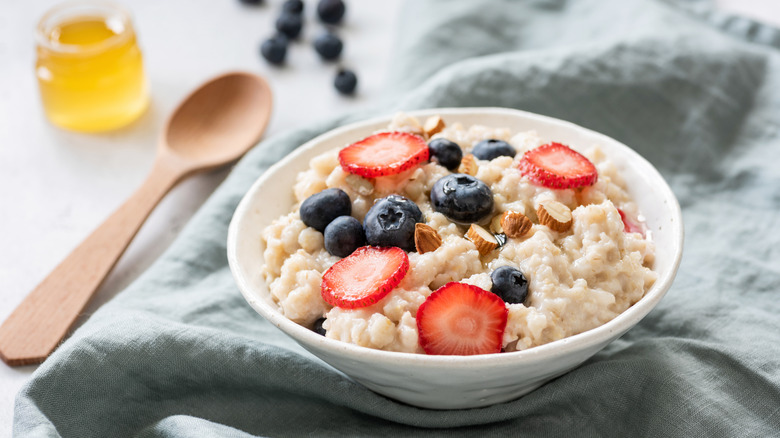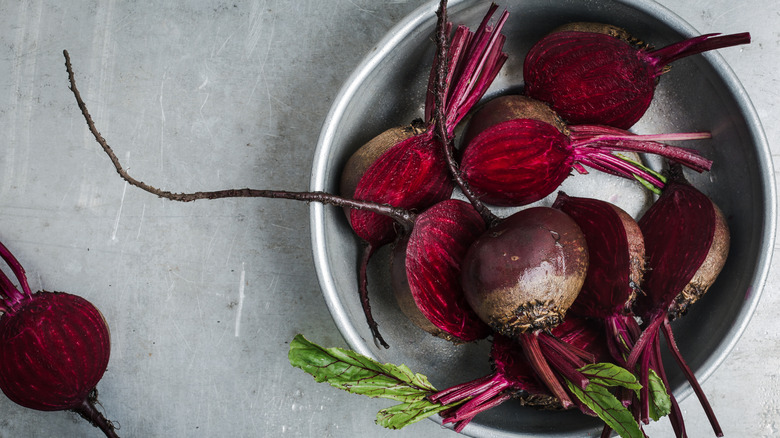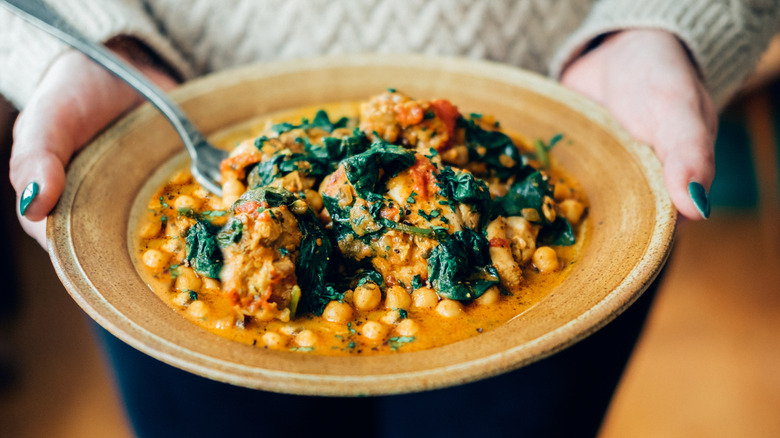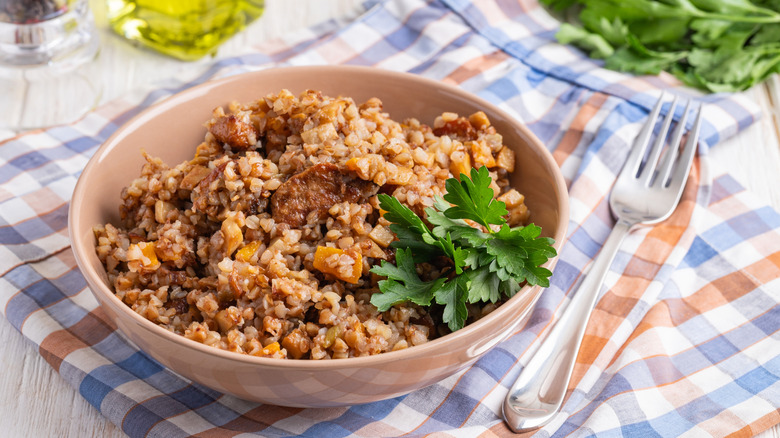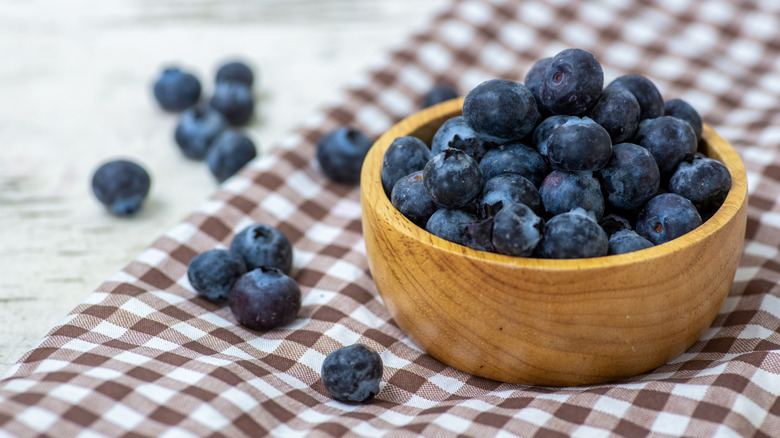The 10 Healthiest Carbs That Can Help Lower High Cholesterol
You've likely heard the old "you are what you eat" adage for decades now. When we're younger, it's more a constant annoyance than anything else — a vague reminder that you shouldn't eat too much candy or indulge in too many fried foods. It's only with time and age that the sentiment behind the adage suddenly takes on far more meaning. If you have high cholesterol, that's especially true.
Some of the most commonly consumed carbohydrates have a fairly negative reputation — think french fries and white bread — but there are also carbs that fall into a completely different category. Believe it or not, there are some carbs out there that are truly healthy and great for your body. These can have a fantastic effect on elevated cholesterol numbers, potentially bringing those numbers down while also offering a protective effect for your heart in the process.
Of course, the old "everything in moderation" adage applies to this, too. Instead of taking an all-or-nothing approach to tackle your cholesterol, it's best to incorporate a variety of these healthy carbs into your diet instead. This keeps things interesting and prevents you from growing bored with the foods over time. Plus, it makes it easier to adopt a more well-rounded and comprehensive eating plan that can be spread over breakfast, lunch, dinner, and even snacks. Doing so could make all the difference to your overall health. Here are 10 of the healthiest carbs to incorporate into your diet if you're hoping to improve your cholesterol.
Brown rice could lower your cholesterol
You're probably aware that brown rice is healthy, but do you know why? Several properties lend the carb its reputation as the "better" rice. Among them is the sheer fact that the brown variety is a whole grain absolutely packed with nutrients, including vitamins, minerals, antioxidants, and fiber. A 2016 study in the BMJ found that consuming whole grains is great for heart health, and that increasing intake could reduce total cholesterol and low-density lipoprotein (LDL), or "bad" cholesterol. Another study published in Nutrients in 2019 found that brown rice reduced LDL and could serve as an effective addition to medically prescribed statin therapy.
That's due in large part to the fiber, which can prevent cholesterol absorption in the bloodstream. Dr. Brian Lima, a director of heart transplantation surgery at North Shore University Hospital, suggested to Yahoo! News that making the switch from other types of rice to brown is relatively easy. "Add it to a salad," he says, "or use it as an alternative to white rice, as a side dish."
Another key reason for its positive impact on cholesterol is the presence of y-oryzanol. This naturally occurring ferulic acid was found to reduce total cholesterol levels, per a 2018 study in the Journal of Diabetes Investigation. Research also indicates that the GABA content in brown rice may support healthier blood vessels, which in turn might prevent cholesterol levels from spiking. Even its rice bran oil may have a beneficial effect, as researchers found that it prevented cholesterol absorption and boosted high-density lipoprotein (HDL), or "good" cholesterol levels.
Purple potatoes might be the key to regulating cholesterol
The purple potato may not exactly be a staple in your kitchen, but if you're trying to reduce cholesterol through diet, you may want to pick up this root vegetable. What's more, the secret to their impact on your body may well be due to their unique color. It's the anthocyanin content that lends them their rich, dark, purple-blue hue. And, according to Sarah Chatfield, MPH, RDN, Chatfield, that's incredibly important. "Anthocyanins have demonstrated antioxidant, anti-inflammatory, and anti-cancer effects in lab and animal studies," she tells Parade. "Anthocyanins have also been associated with improved cholesterol levels and vascular health."
Purple potatoes also contain a type of fiber called resistant starch. As explained by Dr. Scott Kaiser, M.D., a geriatrician and Director of Geriatric Cognitive Health for the Pacific Neuroscience Institute (via Parade), resistant starch passes "[t]hrough your gastrointestinal tract without being digested but [is] fermented by bacteria in your large intestine."
While that's great for your digestion, it's equally crucial to regulating cholesterol. Since it's resistant to the usual intestinal breakdown process, it prevents cholesterol absorption in the bloodstream. As a result, resistant starches reduce not just your total cholesterol but can also bring down LDL levels. They may even bring down high triglycerides, which is vital to your cardiovascular health, as increased levels coupled with high cholesterol could elevate your risk of developing a stroke or heart attack.
Kiwi is exceptional for managing cholesterol levels
It's slightly tart, slightly sweet, and great for those who need to manage their cholesterol levels. This vibrant powerhouse of a fruit is the "green" standard for lowering cholesterol! It's packed with soluble fiber, making it especially effective in both trapping and ushering cholesterol out of the body. This type of fiber has a binding effect on cholesterol during the digestion process, essentially preventing the molecules from being absorbed in the bloodstream. At the same time, kiwi may also lower LDL cholesterol levels.
Kiwi is unique because it contains an especially high concentration of both vitamin C and polyphenols. Both of these antioxidants are linked to improved cardiovascular health because they can efficiently reduce inflammation, which has a protective effect on the heart. That's specifically due to less oxidative stress, which is a key factor in high cholesterol development and damage to the arteries. Kiwi also contains a compound called actinidin, a potent enzyme that facilitates digestion and enhances nutrient absorption — and when your gut works that well, it can more efficiently regulate cholesterol levels.
Another key reason to incorporate kiwi is because it's rich in potassium, which can help regulate your blood pressure and minimize strain on the heart in the process. This, coupled with its cholesterol benefits, makes kiwi an essential addition to any heart-conscious eating plan.
Oats contain soluble fiber to reduce bad cholesterol
Oatmeal is widely considered one of the healthiest foods because it's heart-healthy, loaded with fiber, keeps you satiated for long periods, and could even reduce cholesterol levels. In fact, says Dr. Andrew Freeman, M.D., who's a director of cardiovascular prevention and wellness at Denver's National Jewish Health, tells NBC Today, "My go-to is really oatmeal. I recommend oatmeal as the best option."
Nutritionist Joy Bauer explains that oats remove cholesterol effectively because of their elevated soluble fiber content. Essentially, it works by [g]rabbing onto it and escorting it through your digestive system and out of your body." What's more, oatmeal has a significant impact on LDL levels. Per VeryWell Health, studies have found that consuming between 40 and 60 grams of oatmeal daily could bring down levels by up to 10% — and those levels could decrease even more by increasing oatmeal intake.
Of course, the type of oatmeal that you eat matters. While it's an extremely accessible food available in a wide range of flavors, it's important to avoid the types loaded with sugar, flavorings, and additives, as those can have other negative health effects (like raising your blood sugar). Steel-cut oatmeal in particular is favorable because it has beta-glucan, a type of soluble fiber that prevents cholesterol absorption.
Beets could help you manage your cholesterol
Beets are recommended for a number of reasons. Consider them a "natural" medicine that could potentially help you lower your cholesterol. Known widely for its heart-health benefits, beets are great for overall health. According to Dr. Elsa-Grace Giardina, M.D., the director of the Women's Heart Center in Columbia's Division of Cardiology, "A half-cup of cooked beets contains only about 40 calories, no fat, no cholesterol, and importantly, is low in sodium."
As with other healthy carbs, beets contain a significant amount of fiber. That helps you feel fuller faster, ideal if you're hoping to lose some weight – which can also help lower your cholesterol by eliminating fat from your body. Fibrous beets also have betanin, the pigment responsible for the root vegetable's deep red color, and nitrates, a plant compound. Dietitian Natalie Rizzo explains to NBC Today that these can combat oxidative stress levels and reduce inflammation, and research published in the Proceedings of the National Academy of Sciences (PNAS) has found a link between this reaction and increased cholesterol levels.
Consuming beetroot juice is an alternative that can be equally beneficial. A 2020 BioMed Central (BMC) study revealed that it may have the right effect on both LDL and HDL levels due to its phytonutrient content, resulting in lower cholesterol overall. If you'd prefer to eat beets, chopping them over a salad is simple, as is roasting them to bring out their inherent sweetness.
Oranges have plant sterols to lower bad cholesterol
Sure, oranges are considered the go-to choice for their immune-boosting vitamin C content. This citrus fruit, however, offers so much more for people who hope to lower their cholesterol. Packed with both soluble fiber and phytosterols, oranges provide widespread support for heart health and healthy cholesterol levels.
Key to their impact is the soluble fiber, which causes a gelatinous substance to bind to the cholesterol in the digestive tract. This is the function that prevents the cholesterol from being absorbed in the bloodstream. Regular consumption, therefore, can reduce overall cholesterol and contribute to a healthier heart. Oranges also have phytosterols, which essentially "compete" with the cholesterol for intestinal absorption — and, in the process, reduce how much cholesterol ends up in your bloodstream. Maria Conley, RDN, tells Henry Ford Health, "Studies consistently show that high intakes of phytosterols and stanols can lower total cholesterol and LDL-cholesterol levels by about 10%."
Oranges are also rich in antioxidants, which offer protective benefits against the free radicals that could otherwise interact with LDL and cause inflammatory reactions that increase those levels. The fruit is incredibly versatile, and is just as easy to eat on its own as it is to incorporate into a salad or a smoothie.
An apple a day could keep the cholesterol at bay
You know what they say about apples — and every word of that is true, including the impact that the fruit's soluble fiber has on cholesterol. Dr. Bahram Arjmandi, M.D., who authored a Florida State University study about the effects of eating apples on overall cholesterol levels, tells Parade, "Apples contain a fiber called pectin, which may block the absorption of cholesterol." (His findings were impressive: Those who ate 75 grams of dried apples — the equivalent of two fresh apples — experienced a 14% cholesterol reduction and a 23% drop in LDL.)
Apples also contain polyphenols, which may prevent LDL from oxidizing and causing cholesterol levels to spike (per VeryWell Health). While there are no limits to the humble apple's many health benefits, there is a bit of a caveat where its cholesterol-lowering abilities are concerned. Most studies conducted yielded the most evident results only among subjects (including animals) that consumed an amount of fiber equivalent to the amount found in two apples.
Fortunately, ramping up apple consumption isn't tricky. You can blend one into a healthy morning smoothie, chop one over a salad, eat it solo for a midday snack, or slice it up and enjoy it with cheese and crackers. Your options are virtually endless, but the health benefits may well be worth the effort to make your diet more apple-rich.
Fibrous chickpeas keep your cholesterol in check
Chickpeas are an incredibly popular type of legume — and a sensible addition to any low-cholesterol diet. Small, mighty, and filled with nutrients, chickpeas are rich in soluble fiber and play a vital role in bringing down the LDL levels. Because soluble fiber works simply by binding to the cholesterol in the gut, it can effectively prevent that cholesterol from working its way into your bloodstream. Incorporating more chickpeas into your diet, therefore, can have a notable effect on lowering LDL levels while promoting heart health.
Beyond being fiber-rich, chickpeas are also a great source of plant-based protein and magnesium, supporting normal blood pressure and heart function. This makes them one of the most ideal heart-friendly foods in existence, as they support your cholesterol and overall cardiovascular wellness at the same time. In fact, cardiologist Dr. Long Cao, M.D., FACC, tells The Healthy (via MSN) that cholesterol-free chickpeas are among the best foods to eat daily.
Just as vital to their appeal is their versatility. You can toss chickpeas into salad for a quick protein boost or roast them and season them with your favorite herbs or spices to enjoy a crunchy and delicious alternative to fried snacks. You can use a food processor to transform them into creamy hummus for your celery and carrot sticks. You can even blend them into soups and other recipes. Limitless ways to eat them make chickpeas one of the easier foods to work into your diet.
Buckwheat can be a go-to for reducing cholesterol
While it may not be a part of your regular diet right now, adding buckwheat can really pay off, as it's been found to bring down LDL cholesterol levels and triglycerides thanks to its soluble fiber content. Given its name and even its appearance, people often consider buckwheat to be a form of wheat. However, it's actually a type of ancient seed grain and, when added to your cholesterol-lowering diet, binds to cholesterol and prevents absorption in the bloodstream.
More than just fibrous, buckwheat is full of antioxidants. Among those are rutin and quercetin, flavonoids known for limiting oxidative stress and preventing arterial inflammation (per the University of New Hampshire College of Life Sciences and Agriculture). That plays a vital role in improving cardiovascular health, potentially reducing your risk of developing heart disease in the process.
It's even gluten-free, making it far easier for people to enjoy. It's common to prepare them like overnight oats and consume them cold for a hearty and heart-healthy breakfast (don't forget to top it with some diced apples for a double cholesterol-lowering punch!). Buckwheat bread, pancakes, and patties are also options, and the seed can even be incorporated into dishes like salads and soups for bulk.
Cholesterol-friendly blueberries can improve your numbers
There's a reason that blueberries are considered a "superfood." These tiny-but-mighty berries are full of nutrients, antioxidants, and fiber, making them an exceptional addition to any cholesterol-lowering diet. Specifically, they contain soluble fiber — along with plant compounds like anthocyanin flavonoids — to support heart health by reducing inflammation.
It's the soluble fiber, of course, that is responsible for lowering LDL levels. Registered dietitian Julia Zumpano, RD, of the Cleveland Clinic, tells Everyday Health, "Soluble fiber is a natural cleansing system, helping keep your cholesterol levels down." Plus, a 2019 study in The American Journal of Clinical Nutrition revealed that eating at least 150 grams of the fruit daily could lower your odds of developing heart disease by as much as 15%. They come doctor-recommended, too. Dr. Siyab Panhwar, M.D., who's an interventional cardiologist at the Sanford Bemidji Medical Center, explains to Parade, "Especially in people who already have cardiovascular risk factors such as diabetes, high cholesterol, metabolic syndrome, high blood pressure and smokers, consumption of berries can help reduce their overall cardiovascular risk."
The blueberry is easy to incorporate into a daily eating plan, and could conceivably be a part of every meal. Sprinkling some on oatmeal or cereal gives breakfast a quick antioxidant boost. They can also be added to salads, yogurts, smoothies, healthy baked goods, and more.

